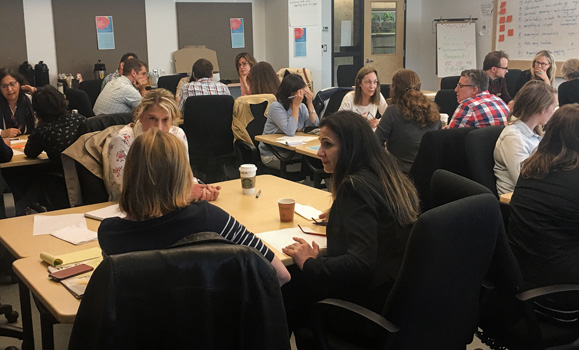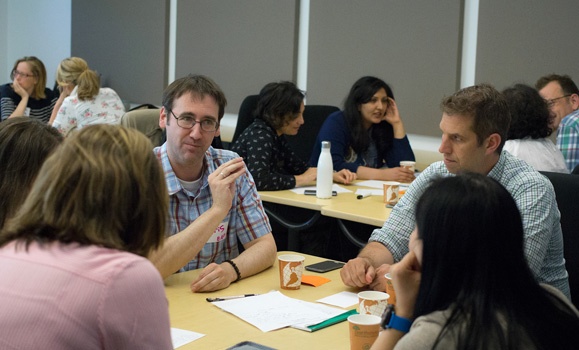Earlier this month, faculty and staff members from the Faculty of Arts and Social Sciences (FASS) language departments joined forces with professionals from the College of Continuing Education’s (CCE) English as a Second Language (ESL) program and the Centre for Learning and Teaching (CLT) to hold the first pilipiliÂţ» Language Instructors Retreat.
Magali Dam-Mazzi, instructor in the department of Spanish and Latin American Studies, came up with the idea to organize this type of retreat.
“It seemed to be a great opportunity to learn from each other’s teaching experiences, methodologies, and to gain insight into different approaches for common issues in teaching a language,” said Prof. Dam-Mazzi. “I also wanted to have a stronger relationship with all language departments and make a connection with ESL. It didn’t make sense to me that after nine years of being at Dal, I still didn’t know all the language instructors and what they do in each of the departments.”
In addition to Prof. Dam-Mazzi., the Dal Language Instructors Retreat organizing committee included Brigid Garvey (German language instructor, FASS), Taghrid Abou-Hassan (French language instructor, FASS), Jennifer MacDonald (Head Teacher, ESL Programs, CCE) and Anna Maier (Instructor, ESL Programs, CCE).
Engagement across the university
Approximately 30 language instructors from across the university attended the retreat, with programming that included ice breakers, professional development, networking, lectures and workshops focused on various styles and principles of teaching and learning vocabulary.
Guest lecturers included Jill McSweeney, educational developer at Dal’s Centre for Learning and Teaching where she teaches and supports graduate students, instructors, and future faculty in their teaching development. Her session was entitled: Shoptalk: Sharing reflections and strategies from your teaching. The visiting presenter was Scott Douglas, assistant professor in the Faculty of Education on the University of British Columbia’s Okanagan campus. His research focuses on the teaching and learning of English as an additional language, which was highlighted in his presentation on Additional Language Vocabulary Teaching and Learning: Thresholds, Principles, and Strategies.

Jennifer MacDonald from CCE said one of the retreat’s goals was to collaborate and forge connections across the university.
“We all have the same goal — teaching a second/additional/foreign language to those who speak another language as their mother tongue. It’s not just a great professional development event, but also a nice networking event for us language instructors to overcome our silos and get to know each other.”
MacDonald added that the retreat was a huge pilipiliÂţ» and that participants provided positive feedback expressing their appreciations of various aspects of the retreat. Some of their comments acknowledging what they took away from the retreat included: “Sharing ideas, meeting people, discussing different approaches,” “the presenter’s enthusiasm was contagious,” “reinvigorating” and “gave us new awareness of our common grounds and differences.” Some participants also gave suggestions for future topics.
Turning it into an annual event
The organizing committee hopes to make this sort of retreat an annual event.
“I really enjoyed working in the organization of this retreat with amazing instructors from different departments and ESL,” said Prof. Dam-Mazzi. “It was a very gratifying experience working together. I learned a lot about ESL. Before, I didn’t think of all the similarities we could’ve shared. They seemed far from us – but they are not. We all teach a language, we all deal with students, we all work at Dal, we all are interested in improving our teaching and having Dal excel in teaching languages.”
Prof. Dam-Mazzi added that another important reason why she wanted to organize this retreat was because of the limited time some of the language instructors have during the academic year for their professional development. Bringing in guest speakers is a way to explore new trends in language teaching and workshops, as well as to improve relationships with the student experience.
“I believe these types of retreats could make us stronger as instructors and as departments. They can inspire us to come up with innovative and creative ideas for Dal and our departments, and solutions for common problems we face when we teach a language.”

